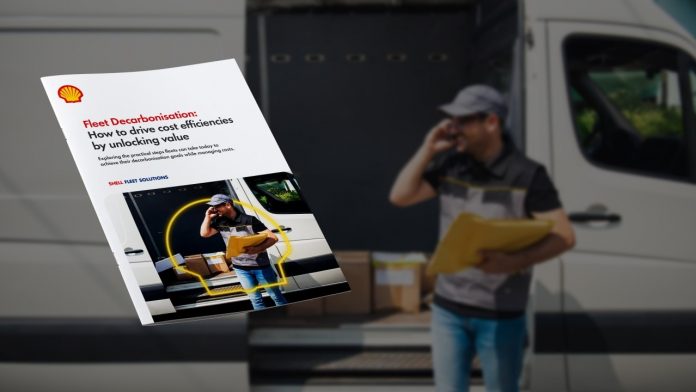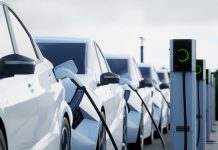Euan Moir, Head of Fleet Solutions at Shell UK, answers questions on the issues facing decarbonising public sector fleets, and why it is important
In just over a decade, new petrol and diesel vehicles will be banned in the UK.(1) Public sector organisations must invest in new, zero-emissions vehicles to decarbonise their fleets. However, this can be challenging, given the upfront investment required to adopt electric vehicles (EVs). In 2022, public expenditure fell by 5.9%, and budget pressure will likely continue.(2)
So, how can public sector fleets decarbonise in a cost-effective way? With the right strategy and technologies, decarbonisation and cost control aren’t just compatible, they can even reinforce each other.
In the recent report Fleet Decarbonisation: How to Drive Cost Efficiencies by unlocking value, Shell Fleet Solutions outlined practical steps businesses can take to balance operational efficiency with their decarbonisation strategy. Euan Moir, Head of Shell Fleet Solutions UK, tells us more about the new report and how decarbonisation can be used to create a lever for more competitive fleet operations.
What are the key challenges of decarbonising public sector fleets?
Fleet operators are shifting to EVs, but the transition is happening slowly, and decarbonisation is not yet a priority for many.(3) Our survey found that only a fifth (21%) of fleets have made a formal commitment to decarbonisation in their KPIs.(3) In contrast, many public sector fleets have already outlined plans to decarbonise their fleet(4) and are looking to private sector partners to understand how to acheive their aspirations.
The report also found that improving operational efficiency is one of the top three most desired benefits over the next three to five years by the fleet operators surveyed. However, the cost of decarbonisation is perceived as the biggest challenge to fleets as they look to achieve their sustainability goals. Public sector fleet managers need to ensure that their investments drive improved efficiency alongside reduced carbon intensity.
Finally, for public sector fleets, reliability and uptime are critical. When they electrify, fleet managers must feel confident that their EVs are suitable for their requirements. And they need effective and robust charging infrastructure to support them.
What advice would you give public sector organisations on decarbonising their fleet?
First, understand the total cost of ownership (TCO) of an electric vehicle. Gaining a strong understanding of your fleet’s TCO over the course of its lifetime or lease allows operators to consider areas where EVs can be more cost-effective than petrol or diesel vehicles. Factors such as maintenance, operational schedules, and charging infrastructure should be considered as part of this.
Conducting an EV suitability assessment using telematics data can help fleets determine which use cases are best suited for immediate transition: those in which EVs can quickly deliver a balance of decarbonisation, performance, and cost efficiency. This strategic approach to the EV transition helps you get the best value upfront and better prepare for future investments.
Operational requirements are also an important factor. The Crown Commercial Service (CCS) fleet portal allows fleet managers to compare vehicles, including environmentally sustainable options, helping to ensure that new vehicles can meet the specific needs of your organisation.
Charging infrastructure also plays a crucial role in operational reliability and a cost-effective transition. Private charging solutions such as depot, home, and office charging enhance reliability. Charging schedules built around operational needs or charging at times that offer cheaper energy tariffs can also help to manage overall costs.
The new Access and Forward-Looking Charges Significant Code Review (Access SCR) regulation also reduces the cost of grid upgrades. Under this rule, customers no longer bear the full cost of upgrading electricity infrastructure at their office or depot. Their electricity supplier must now pay the bulk of the cost. Working with a provider with an extensive public charging network and simple payment solution allows fleets to effectively manage charging costs, even on-the-go.
Procurement cycles, budget constraints and operational requirements mean that electrification often isn’t an immediate option for fleets. Adopting alternative fuels and using data to ensure that your vehicles are driven in the most efficient and economic ways, can help reduce your fleet’s emissions. (5) Telematics also provides valuable data on fuel consumption, engine performance and emissions to help to drive efficiencies in your existing fleet. (5)
How can Shell Fleet Solutions help fleets advance their sustainability goals while managing costs?
Shell has extensive experience working with public sector customers. Our Shell Card fleet management solution, available via the CCS Framework, provides mixed fleets with an extensive refuelling and recharging network. This includes 20,000 public UK charge points.
With one card and one invoice, The Shell Card can also unlock access to other solutions that help with cost-effective decarbonisation.
These include:
- Shell eMobility Solutions: access on-the-go, home, office, and depot charging – including hardware, software and charge point management.
- Telematics: pinpoint vehicles with higher emissions and identify areas for improvement using real-time and Shell Card data. Plus, use data to find the best options for EV replacement.
- Shell Fleet Hub: a secure online management portal for managing Shell Cards and fleet finances all in one place.
If you want to learn more about the themes covered in this article or learn how Shell Fleet Solutions can help your fleet unlock the value of decarbonisation, visit: www.shell.co.uk/shellcard
References
- Gov.UK, Government sets out path to zero emissions
vehicles by 2035, September 2023 - Office for National Statistics, Country and regional public sector finances, UK: financial year ending 2022, 2023
- Based on a study conducted by Kantar commissioned by Shell Fleet Solutions. Research conducted in 2022 amongst 742 businesses – sample of decision makers for Delivery, Operational, Professional & Aggregator Fleets across US, Singapore, Malaysia, Germany, Poland and Netherlands.
- Gov.UK, Zero emission fleets: local authority toolkit, April 2022
- Shell.com, Reduce Emissions With Shell Fleet Solutions
Contributor Details
More About Stakeholder
-
Shell Fleet Solutions
Shell Fleet Solutions help businesses to drive their fleets to net-zero emissions with the Accelerate to Zero programme.
















